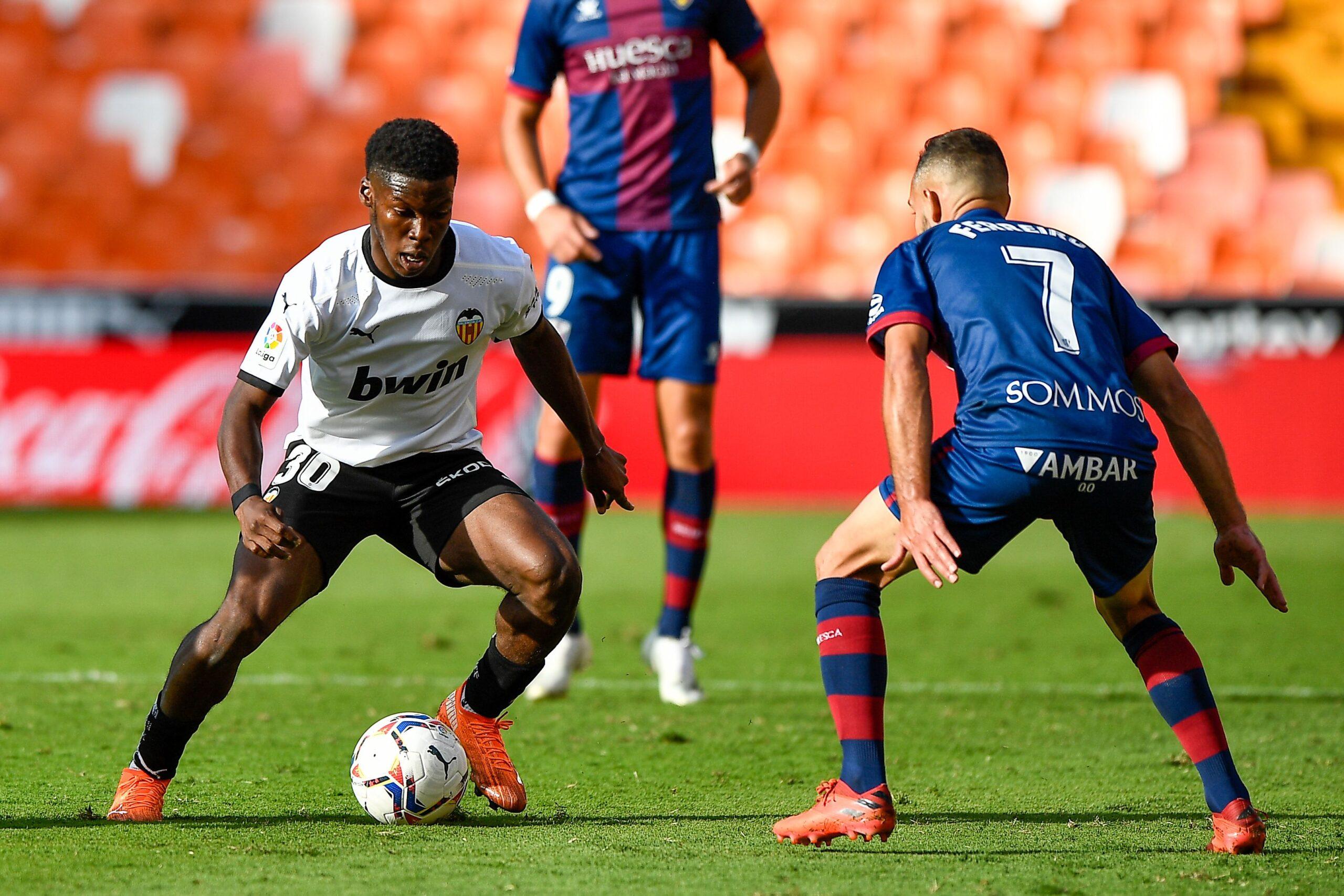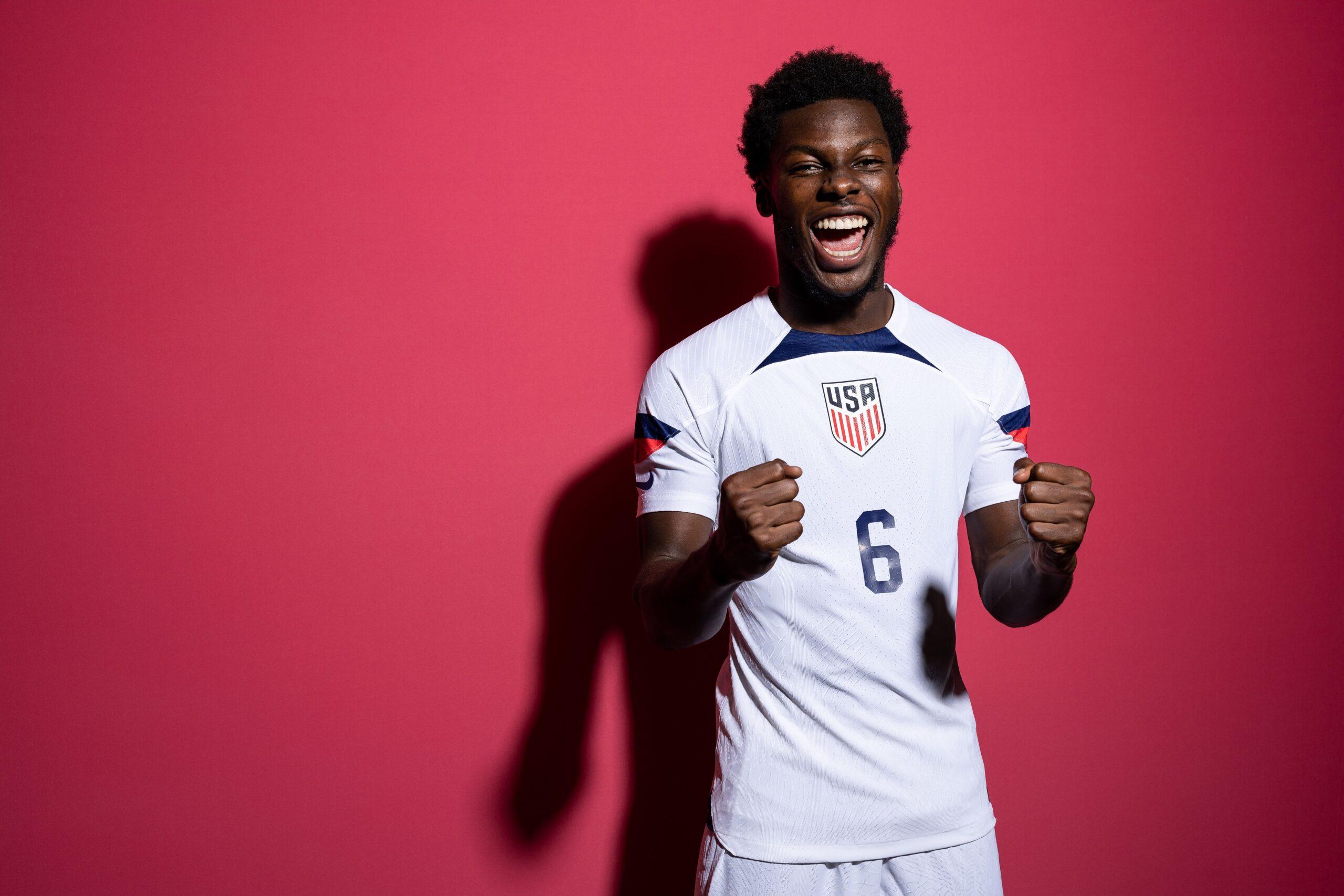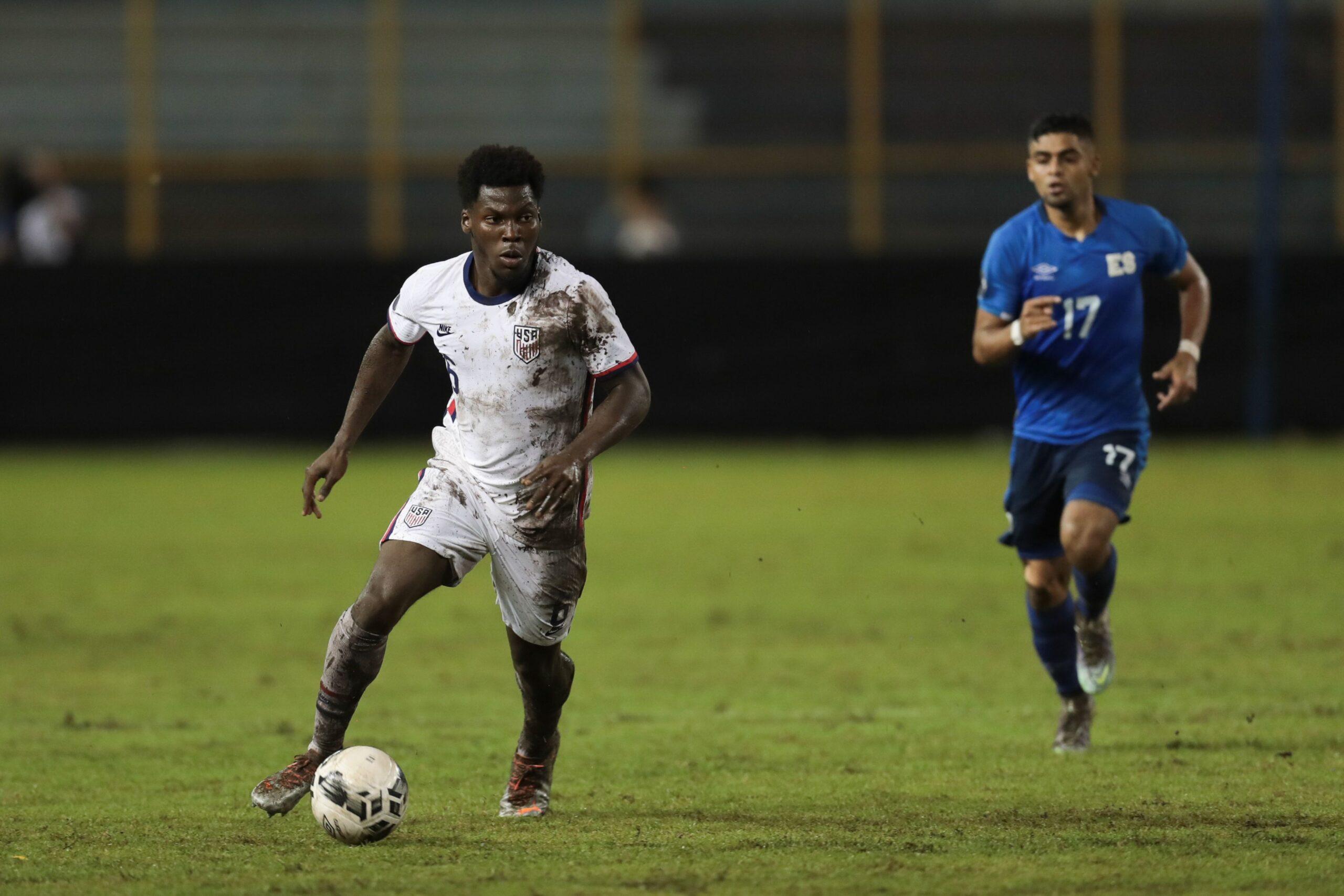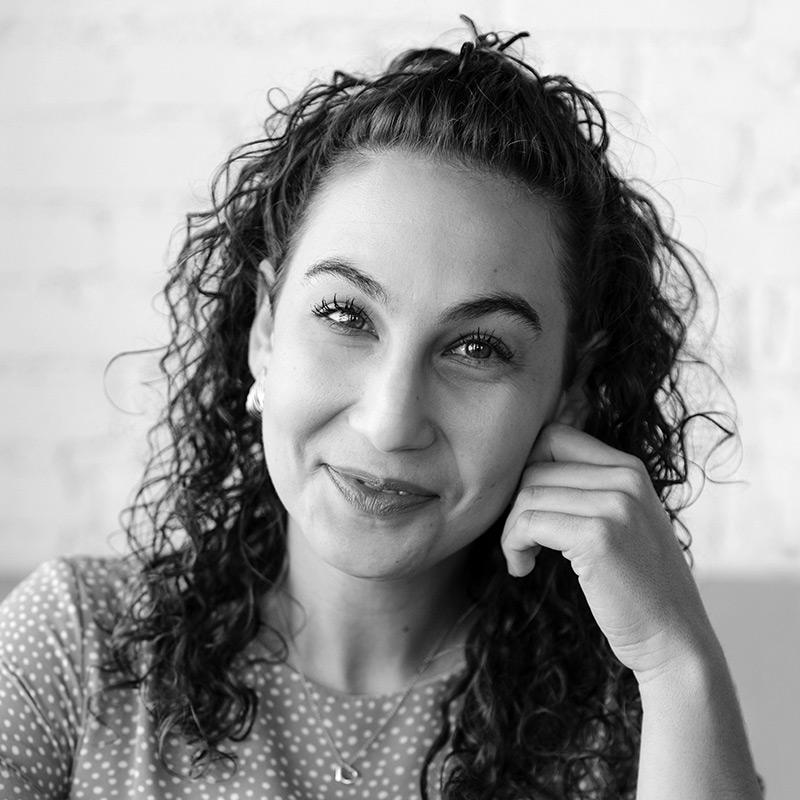Yunus Musah didn’t quite know how to answer people when they asked him variations of the same question.
Where are you from?
He was 16 years old, a budding football prodigy who had just left Arsenal’s academy to join Valencia CF in Spain’s La Liga in 2019, when the queries seemed to peak. He was suddenly out of his comfort zone, away from everything he knew. His world was moving quickly. He’d pause a second, trying to gather his thoughts. Of course, he knew the literal answer.
But when quizzed by reporters, eager to catch a quote from the young midfielder making waves across Europe, he couldn’t muster a thoughtful response into a soundbite. Sometimes he’d respond one way, other times another.
He wanted to give a clear answer, but he didn’t have one. The question wasn’t so simple, not for someone with as circuitous a path as his. Not for someone who has moved from country to country, who was only just beginning to explore his family’s roots.
After leapfrogging to Valencia’s first team as a teenager during the 2020-21 season, he faced more interview requests than ever before. Where are you from? soon morphed into another question, arguably the biggest one of his life: Which country would he represent internationally?
Musah was, remarkably, eligible to play for four different countries: the United States, Ghana, Italy, and England. He loved each of them in their own way.
He ultimately chose to play for the USA, proud to represent his birth country, even though he had lived there for only a few months. But throughout the decision-making process, the more he thought about home—where home is, what home truly means—he felt compelled to look deeper within.
“I clearly don’t know myself,” Musah says.
Musah, who will turn 20 during the 2022 World Cup, is considered one of the most promising soccer players in the world. After a bright start with Valencia, he is more sure of himself than ever. But before he could reach the game’s biggest stage, he had to think deeply about who he was, where he came from, and why he wanted to represent his birthplace despite spending most of his life in Europe.
In a short time, he’s become an integral part of the U.S. men’s national team’s future. He’s a quick and dynamic player who is equal parts passionate and disciplined, unwilling to take plays off. He’s strong and durable and can outmaneuver defenders off instinct. “He’s one of the most complete players that we have on the team,” says Tim Weah, a USMNT winger. “He’s definitely someone I can see holding the midfield down for a long time.”
The USMNT, looking to bounce back after failing to qualify for the World Cup in 2018, will take on Wales in their opening match on Monday. In a bittersweet meeting, Musah will then face off against England on Friday.
To Musah, the decision process that culminated with his playing for the USMNT was an agonizing one, but in the end the move felt … right. “Destiny,” he says. “I was born there for a reason, you know?”
“Things work out the way they are meant to be.”
Musah’s life has been shaped by a series of bold dreams. Big gambles that most heralded prodigies would not even consider, such as leaving Arsenal’s academy at 16, with no guarantee of a payoff, in hopes of advancing to the top level of a pro team. He’s bet on himself at every level, in every country, and had to prove that he could compete against much older competition. At times, he’s struggled. At others, he’s thrived. He’s questioned himself; he’s bounced back. He’s had to grow up quickly. But there was always some part of him, deep in his core, that knew no matter who he was playing, or where he was playing, that he belonged. That he was talented enough to crack a professional first team sooner than others may have thought.
“When he moved here to Spain, nobody was thinking about the World Cup. We were just thinking: professional, you know? Playing professionally,” says Yunus’s older brother, Abdul. “To be here now, looking forward to the World Cup, it’s unreal.
“It’s his moment.”
Musah straddles the delicate balance between being deeply ambitious and deeply grateful. He’s not satisfied with where he is, but he’s appreciative of getting there. Since he was a child, his parents taught him to always practice gratitude—to not be jealous of others’ success.
“Don’t look at other people. Where other people are,” they’d tell him, “Don’t say, ‘That should be me.’” Instead, they encouraged Yunus to not forget his blessings, while also striving toward becoming the best version of himself he could be.
He’s still in that process, somewhere in the middle of his metamorphosis. Or maybe even at the beginning. Though he is considered a rising star within the professional ranks and is reportedly attracting attention from top clubs like Liverpool, Juventus, and Arsenal, he is only just beginning to tap into his potential. He’s eager to show how much more he can do.
“What’s making me tick,” he says, “is I want to establish myself in the world. I want to get the football world to know me better.”

Growing up, Yunus looked up to his parents. Amina and Ibrahim’s own journey inspired him, as they had immigrated from Ghana to Italy for a better life. “They’re definitely my biggest role models,” Yunus says.
Yunus’s father left Ghana when he was around 16 years old, moving to different countries in pursuit of somewhere to settle down. He struggled to find work upon first arriving in Italy. “It was really tough for him,” Yunus says. “He found it really hard to find jobs and accommodation, because of his papers, because of his race, a bunch of things.” His dad pressed on and was finally able to make his way. Knowing he wanted to raise a family, he returned to Ghana, where he met his future wife, before the two started a life together in Castelfranco Veneto, a small town in northern Italy.
Yunus spent the first nine years of his life in Italy, but was actually born in New York City. His mother and Yunus’s older brother, Abdul, went to visit her uncle in New York. Given that she was already pregnant with Yunus, though, doctors advised her that it wasn’t safe for her to travel back to Italy, and that she should stay in New York. After Yunus was born, they stayed a little bit longer before returning to Castelfranco Veneto.
Amina and Ibrahim always made sure that Yunus and Abdul knew their roots. They spoke Hausa, a national language spoken in many countries in West and Central Africa. Yunus smiles when asked about his mom’s cooking. For a moment it’s as if he’s a child again, sitting in his family’s kitchen. He can almost smell her jollof rice, her plantains, her beans. The soothing sounds of sizzling, stirring, simmering. The doughy fufu she prepared with various soups.
Amina ran a local shop, Amina & Co, in Castelfranco Veneto, which offered Ghanaian food and cooking essentials. The shop was warm. Vibrant. Bustling. Other Ghanaian neighbors would gather there and talk for hours, many speaking Hausa. Little Yunus would just listen. “I learned the language even better,” he says.
Their household valued hard work, kindness, and putting God first. They were deeply devoted to the Islamic faith. Yunus especially enjoyed his mom’s cooking to break the Ramadan fast at sunset. He was amazed to see so many Ghanaian people in his mom’s shop; so many who shared his culture in one place. A place where he could feel comforted. Supported.
Home.
But when he was 9, Yunus and his family moved to East London. Yunus didn’t want to move. A gifted footballer from a young age, he was flourishing with his teammates and friends in Italy. He had loved his parents’ shop and the Ghanaian community it nourished. But he didn’t have a choice; he’d have to start over and fit in with new teammates and new classmates.
Abdul made the transition a bit easier. Yunus always tagged along with Abdul and his older friends. They let Yunus play in pickup games at the local park because he was young and small and not yet a threat. They pushed him on the pitch—especially Abdul. Abdul saw potential in his brother, realizing Yunus’s heart was with football.
Yunus would kick a ball around his room, each thump on the caramel-colored tiles irritating his mom to no end. “Stop playing!” she’d say. He wouldn’t. And on days when no one could take him to training, he’d slump into his bed and cry.
Always playing up an age group, Yunus learned to be quick with the ball against bigger, stronger, and more physical players. He joined Arsenal’s academy at age 9 and soon realized that suiting up for the academy was a big deal, as his classmates started to look at him differently. There was tremendous pressure to succeed, to stand out.
“There’s so many people that want your spot at that young age,” Yunus says. “You have to do your best to keep it.” Yunus was always keenly aware of how many didn’t make it. He thought about what it might feel like to sit in a meeting with his coaches and be told to leave. He vowed to give everything on the field so he wouldn’t have any regrets.
He showed up early to practice, sometimes 90 minutes before, perfecting his moves, telling himself that someone, somewhere, was working harder than him. “We literally had to drag him off the football pitch a lot of the time,” says Trevor Bumstead, Yunus’s eventual U16 Arsenal coach.
“Even the day after games, he wouldn’t want to have a rest day,” Bumstead says.
As Yunus came up through England’s national team system, his parents taught him to work hard, but not just in terms of the sport. “They didn’t care if I became a footballer,” Yunus says. “They just wanted me to study and be a good kid.”
That perspective helped him early on at Arsenal, when he was a 13-year-old struggling to play against 14- and 15-year-olds. He wasn’t playing as well as he wanted to and he wasn’t playing that much, either. He remembers telling his dad on a particularly rough day: “I want to leave.”
“I was thinking about going to another team or something, just because I wasn’t playing,” Yunus says. “I was being a little bit childish.”
But he was still a child. A child burning to sprout into a grown-man’s body. Live a grown-man’s life. Become the pro he dreamt of. But that’s the tricky part about being young and on the rise; you are always trying to leap to the next level, but maturation follows its own timeline. You can’t be where you’re not.
Yunus would watch players get selected for England’s national-team camps. He ached to be there. To be them. I want to be on the first team, he’d think. “I was determined to make that happen,” he says.
“I had this mentality of not just trying to become the best at Arsenal but trying to become the best over Europe,” Yunus says. “I can’t be thinking, it’s just about Arsenal. There’s more out there.”
So, early on, when he wasn’t playing much, feeling far from that dream, he listened to his parents, who reminded him not to get too high or too low. He listened to Abdul, who never sugarcoated things. “You have to get better,” he’d tell Yunus. “You’re not as good.
“Everyone is going to tell you what you did well, or compliment you,” Abdul says, “but not many people will tell you what you have to improve.” Yunus would genuinely internalize his brother’s words. “Not everyone wants to listen to criticism or advice, but that can limit you,” Yunus says. “I didn’t want to be limited.”
Sure enough, Yunus turned things around the next season and began to blossom. He eventually captained the U16 team while also playing up with the U18s, helping the team to the 2018 FA Youth Cup final as well as the 2018-19 Youth Premier League South championship. “He wasn’t just holding his own,” Bumstead says, “he was one of the better players in the group. … He loved the challenge.” His stamina was elite. He was consistent. His effort never wavered. But he still had work to do technically. He’d stay hours after practice, laboring on one of his biggest weaknesses: being cleaner in possession of the ball off his left side.
He was thriving against some of the best players in Europe as a 16-year-old. He knew how good those players were—and believed in how good he could become. His ambition, that flickering, gnawing thing inside him that yearned to be there, on a first team now, tugged at him. “I felt like I was ready to make that step,” he says.
Around this time, some players had started to go abroad to different teams as a viable avenue to first-team football. It wasn’t necessarily a trend, but Yunus thought it would be a quicker way to achieve his goal. He loved his time at Arsenal, but he didn’t think he would reach the first-team level as fast as he would have liked if he stayed. He and Abdul considered a few other clubs before deciding that Valencia was the best fit.
It was a stunning move, and a risky one for a teenager at that. “Making this decision is really big, because if I go, I need to make it work. I can’t not make it work and regret my decision,” Yunus says. “So that was really tough. It’s a big gamble, you know?”
His mom didn’t want him to leave at first. She couldn’t understand it; if Arsenal wasn’t kicking him out, why did he want to leave? But Abdul, always in Yunus’s corner, convinced her that it was the right decision. “Mainly it was just about trusting that Yunus was mature enough to embark on this adventure,” Abdul says.
Yunus didn’t mind moving to a different country and starting over. That’s been the rhythm of his life: move, adapt, work. Move, adapt, work. “He was not scared,” Abdul says. In a way, he has always been searching for a kind of home. A place that would allow him to grow and flourish.
Still, it was a daunting challenge, leaving behind his comfort zone. But Yunus was determined to see his decision through and prove that he could jump to Valencia’s first team.
All I have to do is do my job, and it’ll happen, he told himself. Whatever happens, wherever I struggle, I’m not going to regret the decision. I’m not going to start thinking whether I should have stayed or not.

He worked hard to learn Spanish, remarkably picking up the language in his first two months in Spain. The adjustment on the field, however, proved to be far more difficult. Yunus began training with Valencia’s B-team in preseason in 2019, the reserve side playing in the Spanish Segunda Division B. He would sometimes get called up to train with the first team. It was thrilling, being that close to some of the best players in the world. He was the youngest on the pitch but holding his own. But when Valencia’s manager left the team soon after, those opportunities left too.
To make matters worse, Yunus wasn’t playing well, struggling to contribute in matches. Playing time became sparse. He lived in the team’s residency above the training room, always with a view to the field, so he never felt like he could distance himself from his troubles.
What am I doing wrong? What’s wrong with me right now?! Sometimes before matches he’d go on a walk or do similar random things in hopes it might improve his performance. He started to question how he was going to show he was capable of being a first-team player when he was hardly even playing at the B-level.
You can’t get too high; you can’t get too low.
Yunus knew he had to somehow make this situation work. He dug deep, relying on his faith in himself, in God. The Musah family believes things are meant to be—if God wills them to be. “Islam is the focal point in our life,” Abdul says. “Everything that we do in our life is adapted to our religion and what it teaches us.” So, Yunus pressed on: “Even though I wasn’t even playing on the B-team,” Yunus says, “and I wasn’t getting a chance on the first team, I knew I could do it.”
He started playing better. The next preseason, Yunus played well enough to earn a spot on the first-team roster for 2020-21. He broke through with his first start in the season-opening 4-2 victory against Getafe CF in September 2020. He was floored. He kept staring at the team sheet, seeing his name in the starting lineup. He had expected to play maybe a few minutes, max. “That was a really great, big day,” he says. Then he remembers his first-ever goal for Valencia about a month and a half later.
He torched defenders with a 60-yard run before firing a shot that crossed inside the near post. At 17 years and 338 days old, he became the youngest player to score for Valencia in 79 years.
He screamed and jumped up and down with his teammates. Then he knelt down and bowed his head down on the turf for a quiet moment to pray. It was a feeling he can’t fully explain. To finally do the thing you love, the thing you’ve always hoped you could do. Not in your head. Not in a video game. Not within the walls of your room. But in real life, in a big stadium, for everyone to see. The gamble had paid off; the doubts dissipated.
USMNT coach Gregg Berhalter and Nico Estévez, a USMNT assistant coach from 2019 to 2021 and the current coach of FC Dallas, were more than intrigued when they first heard about Yunus. “We didn’t hesitate when we had to go for him,” says Estévez, who spearheaded the approach.
Estévez, who spent eight years working in Valencia’s academy, had received a call from a former colleague: “Hey, Valencia signed a player from Arsenal. And he was born in New York.”
Estévez was intrigued. He started watching Yunus play and was soon mesmerized by how dynamic Musah was on the pitch. The way he could break lines dribbling. “He has a special talent on ball security,” Estévez says. Yunus was poised and had a high football IQ, always aware of what was happening around him. There was a physicality to him, too, making his potential even more tantalizing.
Then Estévez realized how young Yunus was: just 16.
Wow, Estévez thought.
He saw someone who could be a key part of Team USA’s plans not just for the present, but for the future. He told Berhalter: “I think we should monitor [him]. He’s supposed to be really, really good. I’ve been watching him, and he has a lot of potential.” Berhalter started watching, and liked what he saw, too. Estévez began communicating with Yunus and Abdul more, offering to review Yunus’s games to help him grow as a player.
Berhalter and Estévez eventually set up a Zoom call with Yunus and his family. That meant a lot to Yunus. He felt it was genuine, and he felt wanted. “Having the first-team manager of the national team call me at 16, 17? It felt great,” he says. He appreciated that Berhalter invited him to U.S. camp that year but didn’t require a quick commitment or answer. Yunus was able to get a feel for the team without feeling pressure to commit.
It was clear, when Yunus started playing with the U.S., the offense flowed seamlessly with him in it. “It was like he was playing with us for years,” Estévez says. But Musah grappled with his decision. He had so much history with England. He had made more than 30 international appearances for them at various age levels. He had built friendships with his teammates, cultivated important bonds with coaches.
But, ultimately, he felt the U.S. team was the best fit for him. He jelled quickly with his new U.S. teammates and the coaching staff after being called up by the USMNT for its November 2020 matches against Wales and Panama.
The first thing his new teammates noticed about Yunus was his smile. It’s big and cheerful and welcoming. Infectious, almost childlike. It isn’t an exaggeration to say, even now, he’s almost always smiling.
“If there was a definition of what the brightest smile was, it would definitely be him,” says Weah. Weah who has rarely seen Musah without a smile, even in the most difficult circumstances. Back in June, when the USMNT played El Salvador at Estadio Cuscatlán, the field was rain-soaked, muddy, and miserable. Players were slipping and sliding everywhere, many winding up with mud-caked faces, even trying to avoid pieces of metal scattered from an earlier concert held there.

Yet Musah didn’t struggle at all. He looked thrilled just to be on the pitch, floating up and down, as if there weren’t a raindrop in sight. “A lot of young players his age would overthink, and just put a lot of pressure on themselves, and Yunus doesn’t really do that,” Weah says. “Yunus just goes out and enjoys himself. And I think that’s why he fits with the group so well.”
“He just brings that extra joy,” Weah says, “and that extra swagger to the team.”
The beauty of Musah’s path, and part of what makes him so brilliant on the pitch, so fluid and so secure with the ball, is that he quickly adapts to each environment he’s in. Home is wherever he happens to be. “I feel like I’m part of every country that I’ve lived in in different ways,” he says. “I love all those countries.”
Yunus is proud of his Ghanaian heritage and has enjoyed spending time in Ghana, where the majority of his extended family lives. “I love when I go back there,” he says. “It’s really important to know where you come from.”
He is learning, too, that home is more a state of mind than a physical space. It’s the joy he feels, running up and down the field. It’s the obsession he has with the game. Part of what drives Yunus is that, for all of his introspection, he may never morph into the person, the player he envisions himself to be. The joy, for him, is getting closer and closer.
But he’s trying to stay here. In the present. He thinks about how well he wants to play in the World Cup. How badly he wants to win.
He pictures what it will be like taking the field for the first time for the USMNT. “Pure happiness,” he says. A smile emerges. His eyes collapse into mini moons. A tiny dimple surfaces.
His mind is somewhere else now. The match has already started. He can see his family. He can see himself clearly.
